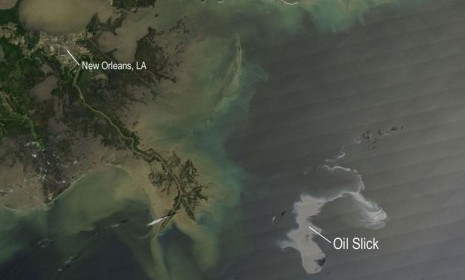The Gulf oil spill: 6 worst-case scenarios
Long-term consequences of the BP spill? Experts warn of wildlife devastation, gasoline price hikes, and a severe seafood shortage

A free daily email with the biggest news stories of the day – and the best features from TheWeek.com
You are now subscribed
Your newsletter sign-up was successful
The Gulf of Mexico oil spill, five times worse than originally thought, could easily surpass the Exxon Valdez disaster in both volume and ecological devastation. The slick has already hit the Louisiana coast and is headed for Mississippi, and the Obama administration is treating it as a national emergency. "I am frightened," says David Kennedy of the National Oceanic and Atmospheric Administration. "This is a very, very big thing." How bad will it get? Here, six likely effects:
1. A 'catastrophe' for wildlife
The oil slick has already affected Louisiana's delicate coastal wildlife preserves, and is headed for the shorelines of Mississippi, Alabama, and Florida. The petroleum could severely damage the habitats of hundreds of species of birds, fish, and other animals — ranging from blue herons to sperm whales. The president of the Institute for Marine Mammal Studies in Gulfport, MS calls the spill potentially "the worst environmental disaster" in the history of the United States.
The Week
Escape your echo chamber. Get the facts behind the news, plus analysis from multiple perspectives.

Sign up for The Week's Free Newsletters
From our morning news briefing to a weekly Good News Newsletter, get the best of The Week delivered directly to your inbox.
From our morning news briefing to a weekly Good News Newsletter, get the best of The Week delivered directly to your inbox.
2. A seafood shortage
One-fifth of U.S. commercial seafood comes from the Gulf — including 75 percent of our shrimp. George Crozier, executive director of the Dauphin Island Sea Lab, says that the crude oil entering coastal estuaries areas may cause a dramatic drop in "seafood recruitment" (as he calls it) for years to come. Louisiana commercial shrimpers have filed a class action suit against BP and its partners. This is already "the worst case scenario for shrimpers, oyster harvesters, crabbers — all the commercial fisherman," says a local expert.
3. Higher gas prices
The 210,000 gallons of oil leaking into the Gulf each day is is a fraction of total U.S. oil consumption. But, if it takes BP weeks to stem the gushing, as seems likely, the spill "may be the final catalyst to push U.S. gasoline prices...solidly above $3 a gallon," says Charley Blaine in MSN Money.
A free daily email with the biggest news stories of the day – and the best features from TheWeek.com
4. A murky future for coastal drilling
Obama maintains that he still intends to open up vast new areas of the coastline to exploration and drilling — but some commentators wonder if a constant stream of images of ecological devastation will redefine the issue. "This could have an enormous political impact," says Robert Brulle, a sociology professor at Drexel University, as quoted in The New York Times. "This will make opening up offshore oil drilling very difficult."
5. Untold billions in losses for BP
Exxon Mobil ended up paying out more than $4 billion for its Valdez spill (and that's before the sum is adjusted for inflation). But the cleanup and settlement cost might not be the worst of it for BP: "The long-term damage to BP’s reputation — and possibly, its future prospects for drilling in the Gulf of Mexico — is likely to be far higher," reports The New York Times.
6. More hardship for the Big Easy
Nearly five years after Katrina, New Orleans finally seemed to be recovering. Now, local news outlets are reporting that a "strong odor blanketing much of coastal Louisiana and the metro New Orleans" may cause "nausea, vomiting or headaches." That's just the start, though: In a city that relies heavily on tourism, the oil spill "could potentially have a devastating impact on the economy," New Orleans mayor Mitch Landrieu told The Times-Picayune.
Sources: NY Times, AFP, LiveScience, USA Today, New Yorker, CS Monitor, Boston Herald, MSN Money, AP (2), Atlanta Journal Constitution, Wall St. Journal, Mobile Press-Register
-
 Currencies: Why Trump wants a weak dollar
Currencies: Why Trump wants a weak dollarFeature The dollar has fallen 12% since Trump took office
-
 Book reviews: ‘Hated by All the Right People: Tucker Carlson and the Unraveling of the Conservative Mind’ and ‘Football’
Book reviews: ‘Hated by All the Right People: Tucker Carlson and the Unraveling of the Conservative Mind’ and ‘Football’Feature A right-wing pundit’s transformations and a closer look at one of America’s favorite sports
-
 Judge blocks Trump suit for Michigan voter rolls
Judge blocks Trump suit for Michigan voter rollsSpeed Read A Trump-appointed federal judge rejected the administration’s demand for voters’ personal data